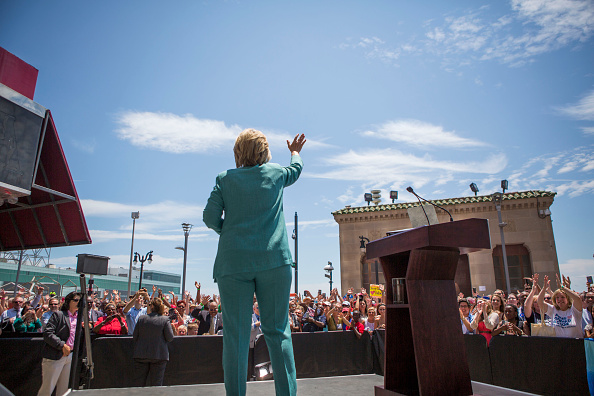
In recent days, Hillary Clinton put out a plan that would provide free college tuition for many Americans. The move was a departure from the complex plan she introduced last summer to make college more affordable. That scheme was largely praised by education wonks. The newest plan treads into territory more regularly occupied by her erstwhile rival, Bernie Sanders, whose platform called for free college for all Americans.
As Clinton seeks to consolidate Democratic support with former Sanders supporters, the move makes political sense, even as it was greeted with skepticism by experts dubious that states would ever fund such an expensive endeavor. But the move was also a striking departure into the world of “big” and “bold” for a candidate most known for more narrowly tailored policy.
In a campaign defined by pie-in-the sky proposals — many put forth by Sanders and Republican nominee presumptive Donald Trump — Clinton has played the role of the scold, admonishing her rivals for their grandiosity while keeping her own proposals sober, responsible and realistic. Sanders won millions of millennial votes with his free health care and college plans; Trump wants to build a wall with Mexico and ban or limit Muslim immigrants. Their ideas rarely went longer than a bumper sticker or a tweet while the Clinton campaign produced white paper after white paper painstakingly detailing Clinton’s nuanced policies.
The former First Lady, New York Senator and Secretary of State has been the Establishment candidate up against two political outsiders: one a Vermont socialist who talked about revolution, the other a political newcomer who specializes in brashness. But it also fits a pattern long seen in political races featuring female candidates who are expected to be serious and responsible in ways their opponents often aren’t.
It’s hard to exact what percent of this can be attributed to gender.
“Hillary is a pragmatist and a deal maker which contributes to her low popularity and trustworthy numbers,” says Michele Swers, a Georgetown University political-science professor who has written two books on women in politics. “If Elizabeth Warren had run, I don’t think you would be saying that female candidates don’t make bold proposals,” Swers says. “It is a function of who their base is and where they sit in the political world.”
At the same time, Warren faced the same criticisms as Clinton when she was running for the Senate: accusations of shrillness when trying to show passion. Yelling is something men can do to inspire: for female candidates it raises hackles. As one voter in New Hampshire said to me about watching Clinton speak: “I feel like I’m in trouble, like my mom’s yelling at me.”
Much of Clinton’s uninspiring expediency comes from the fact that she, as she often notes, isn’t a “natural politician.” She’s just not a great candidate or orator. But it’s also true that the world has rarely had charismatic female leaders.
Can a female candidate dream big? History would argue not — or at least that it’s very difficult. Germany’s Angela Merkel, Brazil’s Dilma Rousseff and Theresa May, the likely next U.K. Prime Minister, are more known for their practicality than their big, sweeping ideas. It’s not that women can’t soar: in many ways royalty like Queen Elizabeth II were born to do nothing but soar, in stiff-upper-lip kinds of ways (even then she has struggled to inspire at some key moments). Populists like Eva Perón and, arguably, Sarah Palin could whip crowds into as much of a frenzy as Trump. But Perón died before she took office and Palin is, well, Palin.
In launching more of a pie-in-the-sky plan, Clinton is dabbling with shedding her pragmatic identity. The question for a candidate with some of the highest disapproval ratings in history is: Can she now learn to inspire?
More Must-Reads From TIME
- What Student Photojournalists Saw at the Campus Protests
- How Far Trump Would Go
- Why Maternity Care Is Underpaid
- Saving Seconds Is Better Than Hours
- Welcome to the Golden Age of Ryan Gosling
- Scientists Are Finding Out Just How Toxic Your Stuff Is
- The 100 Most Influential People of 2024
- Want Weekly Recs on What to Watch, Read, and More? Sign Up for Worth Your Time
Contact us at letters@time.com